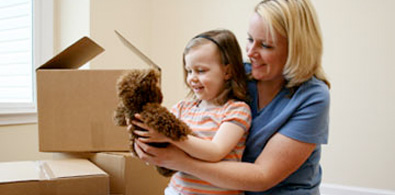
Moving homes is hectic enough as it is, but when there are kids involved, it gets even trickier. Kids are very sensitive to changes and if they notice that you are stressed or worried, they will mirror those emotions.
Seeing familiar belongings and furniture being packed away and saying goodbye to friends and family only to head out into the unknown can cause your children to feel insecure and anxious.
Here are some tips on how to alleviate your child’s fears about the move and possibly even make the whole experience fun:
Discuss the move with your kids well in advance
It’s important to ensure that your kids are given plenty of notice about the move so that they can get used to the idea and have a chance to talk through their concerns.
How much advance you should give your kids depends a lot on their age. Younger children shouldn’t be given too much notice or they will worry about it more than they need to, so generally a few weeks’ notice is sufficient. Older children, however, (preteens and teens) will be angry if they feel like the move has been sprung on them, so it would be better to discuss it with them almost immediately.
Give them plenty of information about your new home
Painting a detailed picture of what your new home and city will be like helps your children to prepare themselves and can alleviate some of the anxiety that comes with not knowing what to expect. Don’t try to make things sound better than they are or they could feel disappointed when they arrive.
Instead, be honest about the situation and explain to them how big the house is, what the garden is like, how near you will be to neighbors and school, and anything else they may want to know.
Choose the right time to move
Parents tend to feel that moving during a holiday is best, as the kids aren’t tied to a certain routine and can start at their new school in the next school period. However, depending on your child’s age, this may not always be the best thing.
Sometimes it can actually be easier for your child to move during a school period, because they can immediately start at their new school on arrival and fall into a routine with new friends and acquaintances.
During a holiday, they may feel displaced in a new place without friends and not much to keep them busy. Of course there is no across the board “right” or “wrong” way, and if your child is older you could discuss it with them and ask them what they would prefer.
Get them involved in the moving process
Keeping your children busy and involving them in some way, however small it may be, can prevent them from worrying too much, and will keep them from getting in the way as well. Make a check list with them of all the things they want to take and ask them to help you with little tasks like labeling boxes, clearing shelves and dusting empty cupboards.
Help them get excited about the move
Because there is a fine line between excitement and anxiety when it comes to moving, make sure you help your child to feel positive about the move. Talk about how fun it will be to decorate a new home and start afresh, and allow them to make plans for how they would like to paint their new bedroom or what type of curtains they want.
Pack up their rooms last
Packing up your child’s room too early could make them anxious and cause them to feel displaced. It is best to leave their room as it is until the last possible moment so that they have a familiar place to retreat to if they start to feel overwhelmed by all the changes.
Also, when packing their belongings, make sure you leave a few familiar toys and possessions out that they can take with them on the trip. Be sure to reassure them that everything you are packing away will be there for them once you reach your new home.
Be flexible
Moving is going to be hectic no matter how well you prepare yourself, so instead of trying to stick to a rigid schedule or enforce the normal rules about television watching or meal times, make it a bit easier on yourself by leaving things a little bit more flexible during the move.
Let them entertain themselves on the trip by watching movies or playing video games, and prepare quick snacks rather than sitting everyone down at the table for a big meal. You can go back to your normal routine once you have settled into your new home and unpacked all the boxes.
Jane Bongato is part of the team behind Open Colleges, Australia’s provider of child care courses. She is an early childhood educator and for the past six years has worked closely with special needs children. She loves to travel, paint and read books about child care and parenting. (Find her on Google+ )
Did That Help!? You Might Like These:
 |
 |
 |
|
|
11 Simple Toy Clutter Solutions |
How to Throw a Backyard Party
|




